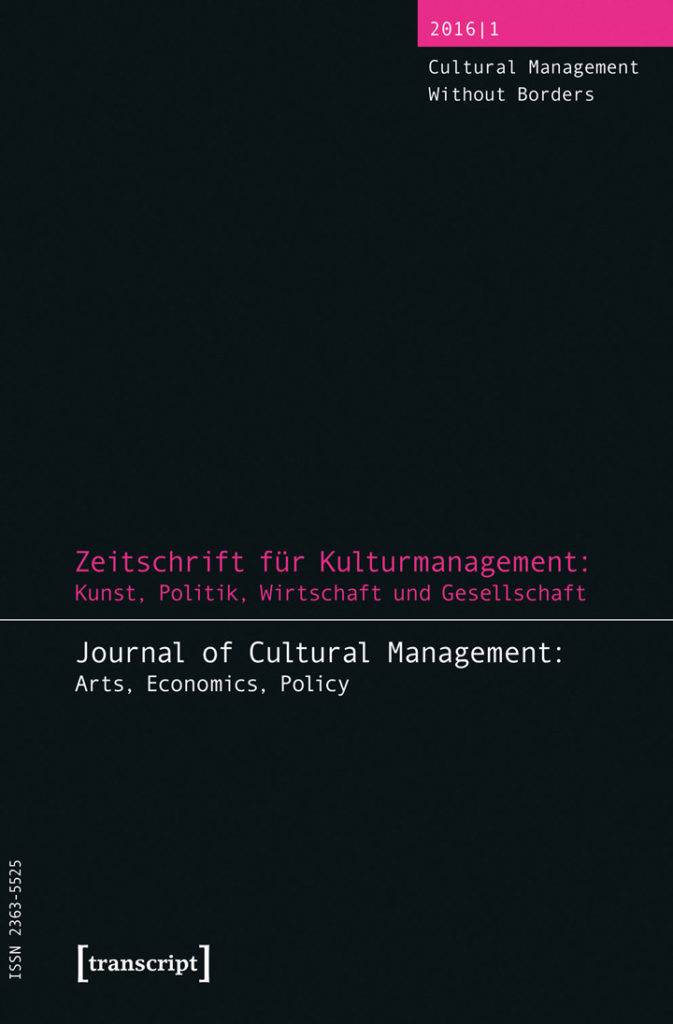Research Article
Cultural Managers as ‘Masters of Interspaces’ in Transformation Processes – a Network Theory Perspective
Abstract
Recently, we can observe a shift – or let us term it a “rediscovery” – of cultural management approaches with regard to cultural politics in rural areas as well as in urban settings. This rediscovery highlights cultural managers as the central players within cultural development processes. It recognizes a new need for the reorganization of cultural infrastructure that is deeply rooted in socio-environmental changes such as globalization, demographic and technological change, and financial crises. What cultural managers actually do is to screen, explore and finally reorder the existing network structures of a given field and facilitate the implementation of new networks. Hence, it was only a matter of time to introduce basic network theoretical thoughts into the academic field of cultural management and cultural sociology research.
The article gives an overview about the contemporary state of the art with regard to recent changes in cultural management approaches. In addition, it will provide the concept of cultural managers as ‘masters of interspaces’ who need to be empowered – not only by formal institutions, but also by local stakeholders. In this way, they can successfully fulfil their task and contribute to fruitful transformation processes within the cultural field. ‘Interspace management’ is the most important skill that modern cultural managers need to obtain. Here, network theory comes into play. Basic network theories are used to lay a foundation for a better understanding of the mechanisms that underpin cultural interventions. This starts from trust building and ends with the transformation of structural holes into weak ties. Here, five different roles that cultural managers can exercise during their mission are introduced. At the end of the article, an empirical case study of a cultural development process in the German state Thuringia is introduced in order to give an example for the importance of network theories and methodologies connected to cultural management.
Keywords
2016 (1)
Cultural Management Without Borders

Related Articles
Journal of Cultural Management 2016 (1)
Case Study
Yearbook for Culture Management 2013
Essay
Dispositive der Kulturfinanzierung
Journal of Cultural Management 2015 (1)
Research Article
Yearbook for Culture Management
Essay
Auf dem Weg zum Publikum der Zukunft
Die neue mobile Ausstellung des Jüdischen Museums BerlinYearbook for Culture Management 2012
Case Study
Power as Concept of structure and organization in theatre
Journal of Cultural Management 2019 (2)
Research Article
© 2024, Journal of Cultural Management and Cultural Policy
Keywords
- aesthetics
- higher education
- cultural diplomacy
- career, professional role
- audience studies
- Business
- digitalization, digitization
- diversity
- empirical aesthetics
- entrepreneurship
- development, transformation
- ethics
- Evaluation
- festival
- film
- social change
- ideology
- staging
- communication
- Concert
- creativity
- culture
- arts organizations, cultural organizations
- fincancing the arts
- cultural history
- cultural economy
- art education
- cultural policy
- cultural sociology
- audience development, art education
- arts administration, arts management
- cultural industry
- cultural sciences
- art
- arts research
- curating
- artists
- leadership
- management
- marketing
- market
- media
- methods development
- museum
- music
- opera
- orchestra
- organization
- law
- social cohesion
- community arts
- state
- urbanism
- dance
- theater
- theory development
- tourism
- civil society, third sector


